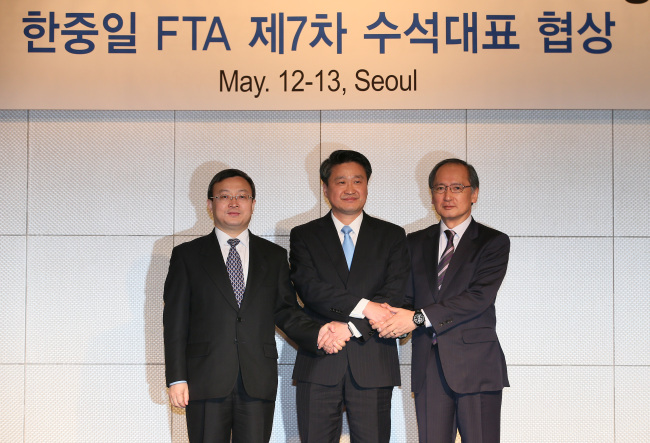South Korea, Japan and China began the seventh round of negotiations for the Korea-China-Japan joint FTA in Seoul on Tuesday, as the chief negotiators from each country vowed to make progress on the trilateral trade pact, emphasizing its benefits.
The high-level discussion, which will continue until Wednesday, marks the first time that the head negotiators from the three states have come together to discuss the terms of the FTA. They will continue to expand upon a series of working-level discussions that began in November 2012.
“The three-way FTA should be a win-win-win FTA. It will bring mutual benefits to all the parties and common prosperity for the region,” said Kim Hak-do, director general for FTA policy at Korea’s Trade Ministry.
 |
Korea’s chief negotiator Kim Hak-do (center) poses with his Chinese counterpart Wang Shouwen (left) and Japanese counterpart Yasumasa Nagamine ahead of the opening of talks on a trilateral free trade pact in Seoul on Tuesday. (Yonhap) |
The proposed FTA, if signed, will establish the first free trade zone among the three nations, which together account for 20 percent of the world’s GDP at more than $16 trillion.
Japan’s Deputy Minister of Foreign Affairs Yasumasa Nagamine asked the three sides to address the trade deal “with a fresh sense of urgency,” adding that it addresses the realistic needs of each country's economy.
China’s Assistant Commerce Minister Wang Shouwen expressed strong commitment to the negotiations, noting that “China will have to do much more value-added contribution than Japan and Korea” since it has been the slowest among the three to reduce tariffs.
The two-day meeting will focus on reaching an agreement on the remaining issues of the FTA, such as determining which products and sectors to liberalize and deciding the scope of market liberalization in each country, according to Korea’s Trade Ministry.
If signed, the trilateral FTA will not only mark a milestone in regional integration in East Asia, but also establish Korea’s first trade pact with Japan, as the two countries have yet to sign a bilateral FTA.
Despite having held six rounds of negotiations for a bilateral FTA, Seoul and Tokyo have effectively suspended talks since 2004, due to disagreements on liberalizing the agricultural sector.
Meanwhile, Seoul and Beijing recently initialed a bilateral FTA in February, and are scheduled to officially sign the treaty within this year.
By Sohn Ji-young (
jys@heraldcorp.com)






![[Exclusive] Hyundai Mobis eyes closer ties with BYD](http://res.heraldm.com/phpwas/restmb_idxmake.php?idx=644&simg=/content/image/2024/11/25/20241125050044_0.jpg)
![[Herald Review] 'Gangnam B-Side' combines social realism with masterful suspense, performance](http://res.heraldm.com/phpwas/restmb_idxmake.php?idx=644&simg=/content/image/2024/11/25/20241125050072_0.jpg)
